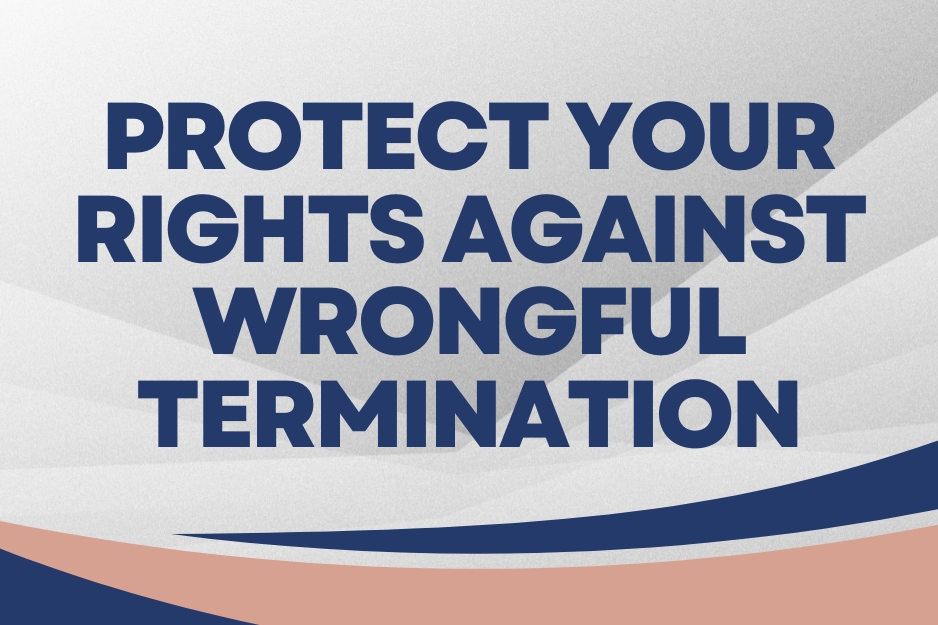
You need an experienced wrongful termination lawyer on your side for many reasons. If you live and work in California, you might have heard it’s an “at-will” employment state.
This means your employer can part ways with you almost any time, and they don’t need to give you a reason or notice. But here’s the catch—not all reasons for termination are legal.
You may have a case for wrongful termination if you were fired for retaliation, discrimination, or breaking your contract. Let’s explore this further.

In California, “at-will” employment gives employers and employees much flexibility. You can leave your job without providing a reason or notice, and your employer can also terminate your employment under similar terms. However, this does not mean employers have carte blanche to fire you under any circumstances.
Even in an “at-will” state, some reasons for firing an employee are strictly against the law. Here are a few scenarios where termination would be considered wrongful:
- Retaliation: Imagine you reported unsafe working conditions or filed a complaint about harassment. If your employer fires you to get back at you for these actions, it’s considered retaliation and is illegal. Your employer can’t fire you for standing up for your rights. For instance, if you filed a discrimination complaint and were fired soon after, you might have a case. This also applies if you were fired for taking family or medical leave, filing a workers’ comp claim, or complaining about unpaid overtime.
- Discrimination: Federal and state laws protect you from being fired based on race, gender, age, religion, national origin, disability, or sexual orientation. For example, when terminated because of your ethnicity, that’s a clear case of discrimination. You might have a case if you lost your job for any of these reasons.
- Violation of Employment Contract: If your employment contract stipulates specific terms for your job duration or termination conditions, and your employer disregards them, they may be violating the contract. If you have an agreement with your employer that specifies conditions for your employment, they need to stick to it. If they don’t, you could have a wrongful termination case where you can seek financial compensation. Remember, employment contracts can be either written or verbal.
Understanding these reasons is crucial. They protect you and ensure fair treatment in the workplace. It is worth exploring your legal options if you’ve been wrongfully terminated for any of these reasons.

To make this more transparent, here are some real-world examples of wrongful termination:
Example 1: Jane reports gender discrimination to her manager. Two weeks later, she’s fired for “poor performance” despite having excellent reviews. Jane could argue that her termination was retaliatory.
Example 2: Carlos, an employee with a disability, requests reasonable accommodation to perform his job. Instead of accommodating him, his employer terminates his employment. This could be viewed as discrimination based on disability.
Example 3: Consider Mike, who reported unsafe working conditions to OSHA. Shortly after, his employer fired him. Mike could file a claim for retaliatory discharge since his termination was clearly linked to his complaint.
If you find yourself in any of these situations, you might have grounds for a wrongful termination claim in California. It’s essential to consult with an employment law attorney to discuss your specific circumstances and get advice on the best course of action.
Feel empowered to stand up for your rights. If you believe your termination was wrongful, take the necessary steps to seek justice. You don’t have to face this alone.
Contact an employment lawyer at RD Law Group if you were wrongfully terminated. Our experienced California wrongful termination lawyers are here to help.
With decades of combined experience, we are ready to discuss your situation.
Call us at 424-535-1500 for an appointment. Our wrongful job termination lawyers are here to defend your rights as a California employee.
While “at-will” employment is the norm, several important exceptions protect employees from wrongful termination. Here’s a quick rundown of situations where you cannot be fired:
- Firing after inducement
- Fraud or misrepresentation
- Violation of implied contracts
- Retaliatory discharge
- Violations of employment contracts
- Violations of public policy, including sexual harassment and pregnancy discrimination
Both state and federal laws prohibit firing employees for discriminatory or unlawful reasons. If you are fired for any of the reasons below, you may have a claim to seek damages.
- Race Discrimination
- Gender Discrimination
- National Origin Discrimination
- Disability Discrimination
- Religious Discrimination
- Demanding overtime pay
- Reporting OSHA safety violations
- Taking pregnancy leave
- Taking family medical leave
- Refusing to sign an unlawful non-compete clause
- Serving jury duty
Did you quit your job because of unbearable working conditions? You might still have a case for wrongful termination. This situation is known as constructive discharge. Simply put, if your resignation was due to a hostile work environment created by your employer, it isn’t considered voluntary.
Even if you resigned willingly, you might still have a case for wrongful termination. If you left due to hostile working conditions created by your employer, it’s considered a constructive discharge. Essentially, your resignation wasn’t truly voluntary.
- Definition: Constructive discharge happens when an employee resigns due to intolerable working conditions.
- Implication: Even though you resigned, the law treats it as if you were fired.
- Significance: Employees facing such conditions can pursue a wrongful termination claim.
Understanding constructive discharge is essential. It ensures that employees know their rights and can seek justice if forced to leave a toxic workplace.
If you feel you’ve been wrongfully dismissed, take these steps:
- Document Everything – Keep records of communications, performance reviews, and any incidents.
- Consult a California Employment Attorney – They can provide legal guidance tailored to your situation.
If you believe you’ve been wrongfully fired from your job, don’t hesitate to seek legal advice. Understanding your rights can help you take the necessary actions to protect yourself.
For more information or to schedule a consultation, contact us today.
If you think you’ve been wrongfully terminated, the first step is to gather all your employment documents. This includes your workplace policies, employee handbook, and performance reviews.
You must prove that your termination was discriminatory and that your employer knew about your protected characteristics. It is important to document when you informed your employer of this characteristic and the time from that point to when you were fired.
Also, record any instances of harassment by your employer or discrimination in the workplace. These details can strengthen your case and help show a pattern of discriminatory behavior.
By following these steps, we can help build a solid case to challenge your wrongful termination effectively.
Our lawyers for wrongful termination are here to help. We work hard to gather crucial evidence and will thoroughly investigate your employment law claim. We’ll review your employment claim to identify any legal violations, including breach of contract.
- No Win, No Fee: Our California employment law firm operates on a contingency fee basis, meaning you don’t pay us unless we win your case. Additionally, you pay us nothing upfront, and we will get paid after we settle your case.
- Experience and Focused: Benefit from our extensive experience in employment law and our commitment to achieving the best results for our clients. Also, we leave no stone unturned when investigating your case and fighting for your rights.
We could recover many damages from filing a wrongful termination lawsuit on your behalf. These could include money for back pay, lost benefits, emotional distress, job retraining, and more.
RD Law Group proudly serves wrongfully terminated employees throughout California. For more information and a free initial consultation, call us at 424-535-1500 or contact us online today!



